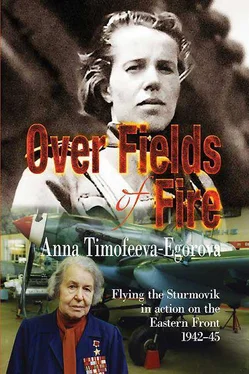“Victor”, I addressed Kravtsov, “Have a look at the photo — what a wonderful girl! You write her a letter instead of me. Make her happy to know the parcel got to its destination — to a young soldier, to a pilot on top of that.”
“Still up to your tricks”, he growled but took the exercise-book…
Red Army Day came. Our squadron gathered for the festive assembly and executive officer Lisatrevich solemnly began reading a Decree on behalf of the Supreme Soviet of the USSR: Lieutenant Spirin was awarded with the Order of the Red Star, Junior Lieutenant Egorova — with the Order of the Red Banner (by now I’d been conferred officer’s rank here in the signals squadron).
I had just flown back from a mission and being a bit late was sitting behind the rest. I still had the noise of a working engine in my ears and I didn’t catch whom the awards had gone to. Suddenly they all clustered around me, began to congratulate me, but I was standing and not believing it: why me? One might say, I’d found myself at the Front by chance. I’d carried out all the missions I’d been given as a soldier should, from the heart. But there was no denying that although it had often been difficult I’d done my best. For some reason I recalled the road reconnaissance sortie — to find out which troops were on the march — ours or the enemy’s… You couldn’t say it was much fun to fly in the daytime in a defenceless plane whose only weapon was the pilot’s revolver! Everyone knew the German aces chased our planes and it wasn’t a big challenge for a Messerschmitt to down a U-2, but their reward for this would be the same as for a shot-down fighter plane.
“Comrade Commander, what’s wrong with you? Are you alright?” I heard the voice of Dronov the mechanic. “You look awful…”
“I’m fine, what’s up?”
“They’re calling you to the presidium.”
The Order was presented to me by a member of the Frontline Military Council Leonid Romanovich Korniets: the very same General who had shown me by mimicry and gestures that I had to report the location of the Cavalry Corps of Parkhomenko and Grechko not to him but to the Front Commander.
17. A hooligan on the road
In May 1942 the South-Western Front troops began their advance in the direction of Kharkov. We, the airmen of the Southern Front Signals Squadron, were always abreast of events on the front line. We would be advised of the situation before a sortie and we would narrow it down, making flights either to this or that army, corps or division. The troops of the South-Western Front would have to destroy an enemy army grouping and liberate Kharkov. Two of our frontline armies — the 9th and the 57th — were supposed to work together with the South-Western Front. And on 20 May they ordered me to fly to the 9th Army with a top-secret package. I don’t remember why I had to fly alone. Usually we would fly with navigators, signals officers, special messengers or with someone else but this time I had taken off alone. I remember that approaching the town of Izyum I saw on the roads and simply across fields the movement of our troops. Many fires showed themselves in the Severnyi Donets Valley, near Svyatogorskiy and in Izyum.
Fires had always aroused in me unreasoning alarm and anxiety since childhood. “A thief will leave the walls at least, but a fire will leave nothing!” the people of our village used to say. It had stuck in my memory for the rest of my life how the harvested corn had burned. Before threshing the corn was usually dried in barns. The sheaves would be stacked on grates in covered bays and a large stone oven — a teplinka — would be heated underneath. Heat would come up and dry the sheaves for threshing. Our corn barn caught fire from failing to watch the teplinka . A heart-rending cry resounded in the middle of the night: “Fire! We’ve got a fire!” Everyone jumped out of bed and began to rush about the house. My half-dressed brothers dashed out of the house, and mum couldn’t even make it to the door, holding in her hands the first thing that had fallen into her hands — the samovar …
Now there was a war: whole cities, our whole land, were burning but still I couldn’t get used to the fires. And now my heart thudded anxiously at the sight of the burning valley. And above me in the sky an aerial battle was raging. A couple of our I-16s were fighting against six Me-109s. The odds were not even but our pilots were skilfully avoiding the Messerschmitts’ fire, closing in for head-on attacks, and the Fascists, fearfully keeping their distance, couldn’t do much. Our guys obviously had the advantage. They shot down one Me-109: it crashed, and I must admit I was gloating and didn’t notice when a German fighter pounced on me like a black kite. A fiery spurt cut the air in front of my eyes. I wished I could dive into a ravine or a gully but there were only flat fields with loose piles of last year’s corn before me nearly up to the very horizon. On the right there was solid forest, on the left — the town. My machine caught fire: it immediately became hot and stuffy in the cockpit. The tail was burning — now it was going to reach me, the engine, the fuel tank and then… Having barely touched down I jumped out of the plane and tearing off the smoking rags of my overalls ran towards the woods. The German seemed to have gone berserk. He descended to contour level and turned the whole fire of his guns on me. In 1941 and also in 1942 the Hitlerites could afford this luxury — to chase a lone Russian soldier across the fields in a tank, to strafe someone with all cannons and machine-guns, diving from the sky… But I kept on running and falling over. At times I would fall down pretending to be dead and hiding my head under the corn stalks, arms and legs spread out. When the Messer went away to turn around I would jump up, clasp the secret package to my bosom and run again…
Having expended all his ammo the Fascist flew away. I was in a forest. It was quiet — there was no one around. And suddenly I wanted so much to lie in the glade, as in my childhood, to shut my eyes and switch off! Young foliage had already appeared on the trees — the spring was coming into its own. I had never been afraid of death but suddenly now I wanted to live so much! It would be bad to die in the spring. One’s life is much, much dearer in the spring…
Whilst I was on the run my plane had burned to the ground. The bag of mail and my leather jacket that were in the fuselage had burned too. What could I do now? How to find the 9th Army headquarters? Looking around I saw a telephone cable hanging on some tree branches. I followed it, hoping it would lead me to some command post. I had barely walked thirty paces when I met two soldiers who were winding the cable onto a reel.
“Where’s the CP?” I asked them.
“What do you mean the CP, the Germans are there!” they yelled without stopping. “It was evacuated long ago, everyone’s gone.”
“Where to?”
The soldiers didn’t know — their business was to wind the cable. Coming out of the forest I ran towards the road across a field — but the road was empty. Lone soldiers and small groups of horsemen moved however they could, staying away from the road. A truck racing past rode around me as I stood in its path with my arms stretched out. Then an Emka 86 86 Translator’s note — a Soviet-made light vehicle M-1.
appeared — I tried to wave it down but in vain — the Emka dashed past me without slowing down. Then without stopping to think I pulled out my revolver and fired into the air. The driver reversed and stopped not far away from me. Then a front door opened and a dashing captain with a medal on his chest effortlessly leaped out of it. He deftly snatched the weapon from my hand, twisted my arms behind my back and then thrust his hand into a breast pocket of my blouse for my papers. I couldn’t allow him to treat me this way! No less deftly I bowed my head and bit the captain, who screamed from pain, on the hand — the blood actually spurted! I saw a chubby General get out of the car. He began questioning me: who I was and by what right I was behaving outrageously on the road.
Читать дальше












